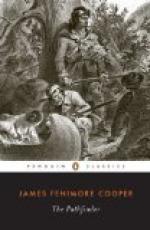“Ah’s me, Sergeant! It has been sad, as you say. That there has been treachery, and the position of the island has been betrayed, is now as sartain, in my judgment, as that we still hold the block. But — "
“Major Duncan was right,” interrupted Dunham, laying a hand on the other’s arm.
“Not in the sense you mean, Sergeant — no, not in that p’int of view; never! At least, not in my opinion. I know that natur’ is weak — human natur’, I mean — and that we should none of us vaunt of our gifts, whether red or white; but I do not think a truer-hearted lad lives on the lines than Jasper Western.”
“Bless you! bless you for that, Pathfinder!” burst forth from Mabel’s very soul, while a flood of tears gave vent to emotions that were so varied while they were so violent. “Oh, bless you, Pathfinder, bless you! The brave should never desert the brave — the honest should sustain the honest.”
The father’s eyes were fastened anxiously on the face of his daughter, until the latter hid her countenance in her apron to conceal her tears; and then they turned with inquiry to the hard features of the guide. The latter merely wore their usual expression of frankness, sincerity, and uprightness; and the Sergeant motioned to him to proceed.
“You know the spot where the Sarpent and I left you, Sergeant,” Pathfinder resumed; “and I need say nothing of all that happened afore. It is now too late to regret what is gone and passed; but I do think if I had stayed with the boats this would not have come to pass. Other men may be as good guides — I make no doubt they are; but then natur’ bestows its gifts, and some must be better than other some. I daresay poor Gilbert, who took my place, has suffered for his mistake.”
“He fell at my elbow,” the Sergeant answered in a low melancholy tone. “We have, indeed, all suffered for our mistakes.”
“No, no, Sergeant, I meant no condemnation on you; for men were never better commanded than yourn, in this very expedition. I never beheld a prettier flanking; and the way in which you carried your own boat up ag’in their howitzer might have teached Lundie himself a lesson.”
The eyes of the Sergeant brightened, and his face even wore an expression of military triumph, though it was of a degree that suited the humble sphere in which he had been an actor.
“’Twas not badly done, my friend,” said he; “and we carried their log breastwork by storm.”
“’Twas nobly done, Sergeant; though, I fear, when all the truth comes to be known, it will be found that these vagabonds have got their howitzer back ag’in. Well, well, put a stout heart upon it, and try to forget all that is disagreeable, and to remember only the pleasant part of the matter. That is your truest philosophy; ay, and truest religion too. If the inimy has got the howitzer ag’in, they’ve only got what belonged to them afore, and what we couldn’t help. They haven’t




